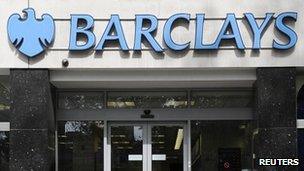Q&A: Banking inquiry row
- Published

The Barclays scandal has led to a row over the best kind of inquiry
The main political parties are at loggerheads about how best to deal with the Barclays interest rate-rigging row. Labour says it wants a full judge-led inquiry, but the government insists a specially set-up committee of MPs and peers should do the job.
<bold>So, how do inquiries work and what is going to happen?</bold>
What is an inquiry?
It is an attempt to reach judgements on an important public issue. In recent years, subjects as diverse as the Iraq War, the treatment of residents in caravan parks and the future of gambling in the UK have been looked at. Documentary evidence is looked at and key figures are questioned before a report is ultimately produced. It is hoped that findings will influence government policy and alter public opinion. The end result could be a change in the law or in the workings of major institutions.
So, what is the latest row about?
Traders at Barclays Bank and other banks manipulated the Libor and Euribor interest rates - which apply to trillions of lending between banks - from 2005 to 2009 for their own advantage. This has united political parties in calling for an investigation into what went on and what needs to be done to ensure there is no repeat of such potentially damaging behaviour. However, the coalition government wants a specially set-up parliamentary committee of MPs and peers to investigate and report. Labour, on the other hand, wants a judge-led inquiry.
What is a parliamentary inquiry?
There are several cross-party select committees set up by Parliament to monitor the work of government departments and make recommendations to them on what should happen in their specialist fields. Findings are reported to the Commons. The government then usually has 60 days to reply to the committee's recommendations. It is under no obligation to act on them, but it often does.
What is the government proposing now?
It says a committee of peers and MPs should convene to look at what went on at Barclays and report its findings back within a "few months". It would be under the leadership of senior Conservative MP Andrew Tyrie, who is the chairman of the Treasury Committee. It would have the power to question witnesses under oath. Ministers argue that a parliamentary inquiry means recommendations can be made in time to be incorporated into a bill going through Parliament which is aimed at reforming the banking system. They have promised to act on the committee's findings. The committee could also look at other issues as part of its remit to examine professional standards in the industry.
Why is Labour against the idea?
It wants a judge, rather than politicians, to lead the inquiry - that is what is happening in the Leveson Inquiry into media standards. Labour says this is the only way to ensure public support for any changes, as judges, not affiliated to any party, are seen as objective and therefore more likely to reach a decision free from political calculations.
How do judge-led inquiries work?
They are far rarer than parliamentary inquiries. A judge, or former judge, is appointed and is able to use his or her legal powers to summon witnesses and get hold of relevant documents. At the end of the investigation, they compile a report which is published, offering judgements and recommendations. The best-known of these in recent years was the Hutton Report in 2004 into the death of weapons inspector David Kelly. Judge-led inquiries can also look at wider issues, such as the ongoing Leveson Inquiry into the culture, practice and ethics of the press.
How long do they take?
The coalition says the work done by judges in heading inquiries is too time-consuming to deal with the immediate concerns unearthed by the Barclays scandal. It warns that any recommendations could be so slow in coming out that the law might not change until 2017, more than a decade after the interest rates-fixing scam began. But Labour says this depends on how wide-ranging the inquiry is. The very narrowly focused Hutton Inquiry took just under six months to report. The Leveson Inquiry began its formal hearings last November and is expected to report by the end of this year, although no specific date has been set. But the Bloody Sunday Inquiry, into events surrounding the deaths of 13 people in Londonderry in January 1972, cost £195m and took 12 years in total.
How will the parties reach a decision?
There will be separate votes on the government and Labour proposals at the end of a Commons debate on Thursday. The government has a majority in Parliament of more than 60 and is likely to win both votes. Ministers say both sides should respect the will of MPs whatever they decide to do. Attention is likely to focus on how Labour votes regarding a parliamentary inquiry and whether it chooses to oppose it outright or to withold its backing by abstaining.
What if agreement is not reached?
Conservative MP Andrew Tyrie, chosen to lead the parliamentary inquiry, has threatened to stand aside unless he receives cross-party support, for fear of being seen as partisan. His comments will increase pressure on the opposition to fall in line, but the Labour leadership insist that a judge-led inquiry remains the only credible option.